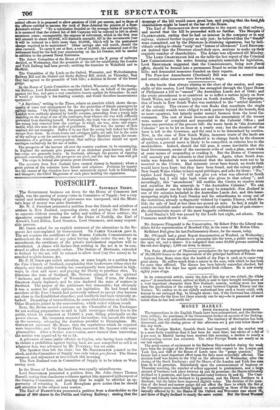POSTSCRIPT.
SATURDAY NIGHT.
The Government business set down for the House of Commons last night, was the passing of money-votes in Committee of Supply: but a very varied and desultory display of grievances was interposed, and the Minis- ter's hope of money was quite frustrated.
Mr. W. J. DENISON presented a petition from the friends and relatives of settlers in New Zealand, expressing alarm, and praying the House not to separate without securing the safety and welfare of those settlers: the signatures comprised the names of the Duke of Norfolk, the Earl of Arundel, Lord Dillon, Lord Stourton, Lord Oranmore, and many respect- able persons. Mr. SHEIL asked for an explicit statement of the alterations in the Be- quests Act contemplated by Government. Sir JAMES GRAHAM gave it. The act requires the certificate of the Roman Catholic Commissioners to authenticate the station of any priest having rights under the act: by an amendment, the certificate of the priest's ecclesiastical superiors will be substituted. A clause will declare that nothing in the act is to be con- strued to affect the monastic orders. The Statute of Mortmain, extended to Ireland by the act, will be relaxed to allow land (say five acres) to be attached to glebe-houses, &c.
Mr. P. M. STEWART called attention, at some length, to a petition from the Free Church of Scotland, complaining that landowners refuse sites for chapels, and that public worship has consequently been performed in high- ways, in sleet and snow; and praying for liberty to purchase sites. To illustrate the state of Scotland, Mr. Stewart enlarged on the spiritual "darkness and destitution" of Westminster. That, if true, Sir JAMES GB.AHAM deeply deplored; and he also deplored the state of matters in Scotland. The prayer of the petitioners was reasonable; but obviously it was a matter for public opinion, not legislation. He had heard that members of the Free Church had perversely refused to accept sites because not close to the Established churches; and landlords had been virulently at- tacked. Despairing of reconciliation, he counselled toleration on both sides. Other Members joined in the conversation; which ended without result Next, Mr. Hums moved a censure on the Chancellor of the Exchequer for not making preparations to call in light sovereigns without loss to the public, which he estimated at 75,000/. a year, falling principally on the poorer classes. Mr. SPOONER seconded the motion; but turned the debate on the currency, advancing the doctrines peculiar to Birmingham. Mr. Gorusirstri answered Mr. Hume, that the regulations which he required were impossible; and Sir ROBERT PEEL answered Mr. Spooner with some pleasantries. After a further conversation, more earnest than interesting, the motion was negatived by 64 to 34.
A grievance of some junior officials in Ceylon, who having been suffered to violate a prohibition against buying land, arc now compelled to sell it at Whatever loss, was advanced by Mr. TUFNELL; but set aside.
The Speaker then left the chair; but Mr. BROTHERTON pointed to the clock, and the Committee of Supply was only taken pro forma. The House resumed, and adjourned at two o'clock this morning.
The New Zealand vote in Committee of Supply is to be taken on Wed- nesday next.
In the House of Lords, the business was equally miscellaneous.
Lord BROUGHAM presented a petition from Mr. John James Thomas Russell, stating that slanderous evidence against him appeared in:the report of the Gaming Committee; and praying that he might be afforded an op- portunity of rebutting it. Lord Brougham gave notice that he should call attention to the subject next session.
The Earl of BARDWICKE presented a petition from a shareholder to the extent of 500 shares lathe Dublin mad Galway Railway; stating that the stoppage of the bill would cause great loss, and praying that the hendsfdit shareholders might be heard at the bar of the House. The Earl of BESBOROT3Gli drew attention to the report on that railway, and moved that the bill be proceeded with no further. The Marquis of CLANBICARDR stating that he had no interest in the company or in any railway, claimed further inquiry as only just: be believed that the" frauds* were committed, not by the Directors in obtaining signatures, but by indi- viduals seeking to obtain "scrip" and "letters of allotment." Lord BROUGH- AM insisted that the Directors closed their eyes, anxious to make up their requisite number of shareholders. The debate was adjourned till Monday. The LORD CHANCELI.OR laid on the table the last report of the Criminal Law Commiseioners; the series forming complete materials for legislation. Lord Buonomist suggested that the Commissioners, being now fana officio, should be formed into a permanent Board to revise the statutes and bills; and demanded measures founded on their reports.
The Poor-law Amendment (Scotland) Bill was read a second time; and several other measures were forwarded a stage.


























 Previous page
Previous page